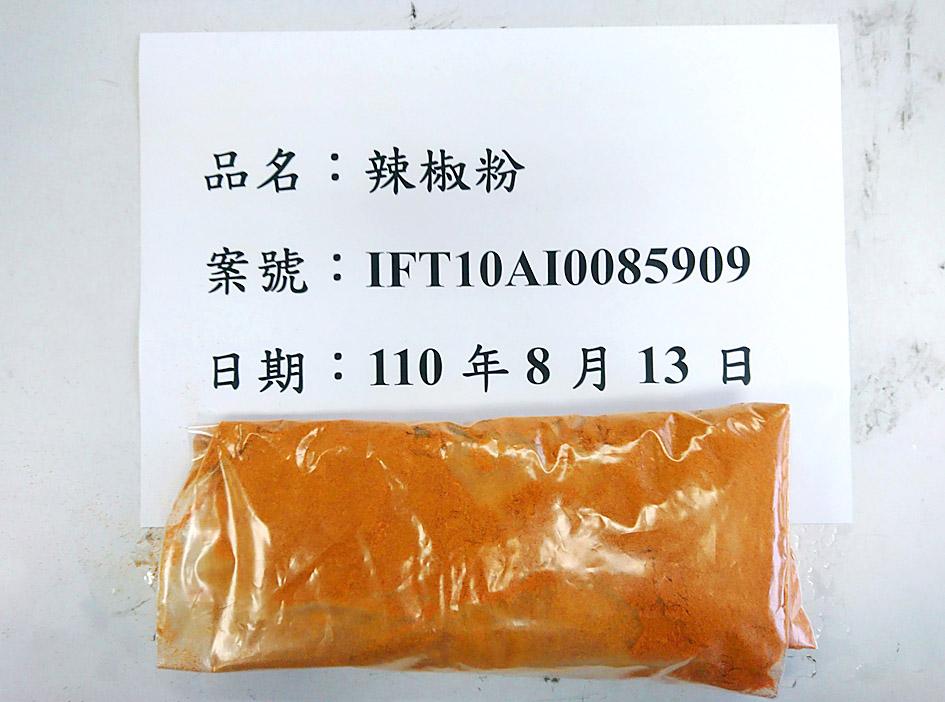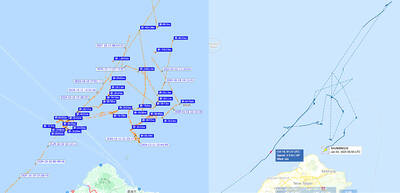Customs officials have seized a shipment of cayenne pepper powder from China after it was found to contain a prohibited coloring agent, the Food and Drug Administration (FDA) said yesterday.
The cayenne powder, shipped by Long Hai Tong Ji Foods Co, was seized because it was found to contain 7 parts per million of a dye called Sudan III, the agency said.
The use of the chemical substance is banned in Taiwan, FDA division head Chen Ching-yu (陳慶裕) said.

Photo: CNA
It was not the first time that the illegal coloring agent was found in imported items from China, Chen said, adding that the agency would bolster inspections of such imported products.
Yen Tzung-hai (顏宗海), director of Linkou Chang Gung Memorial Hospital’s Department of Clinical Toxicology, said Sudan III is a soluble diazo dye used to color industrial substances such as oils, waxes and plastics.
When consumed, the series of Sudan dyes — I to IV — can break down into amines that have been proven to be carcinogenic in animals, although such an effect has not been established in humans, Yen said, citing the International Agency for Research on Cancer.
The seized shipment would either be returned to its country of origin or destroyed, said the FDA, which also published a list of 25 imported items that had failed safety inspections.

A strong continental cold air mass and abundant moisture bringing snow to mountains 3,000m and higher over the past few days are a reminder that more than 60 years ago Taiwan had an outdoor ski resort that gradually disappeared in part due to climate change. On Oct. 24, 2021, the National Development Council posted a series of photographs on Facebook recounting the days when Taiwan had a ski resort on Hehuanshan (合歡山) in Nantou County. More than 60 years ago, when developing a branch of the Central Cross-Island Highway, the government discovered that Hehuanshan, with an elevation of more than 3,100m,

Death row inmate Huang Lin-kai (黃麟凱), who was convicted for the double murder of his former girlfriend and her mother, is to be executed at the Taipei Detention Center tonight, the Ministry of Justice announced. Huang, who was a military conscript at the time, was convicted for the rape and murder of his ex-girlfriend, surnamed Wang (王), and the murder of her mother, after breaking into their home on Oct. 1, 2013. Prosecutors cited anger over the breakup and a dispute about money as the motives behind the double homicide. This is the first time that Minister of Justice Cheng Ming-chien (鄭銘謙) has

SECURITY: To protect the nation’s Internet cables, the navy should use buoys marking waters within 50m of them as a restricted zone, a former navy squadron commander said A Chinese cargo ship repeatedly intruded into Taiwan’s contiguous and sovereign waters for three months before allegedly damaging an undersea Internet cable off Kaohsiung, a Liberty Times (sister paper of the Taipei Times) investigation revealed. Using publicly available information, the Liberty Times was able to reconstruct the Shunxing-39’s movements near Taiwan since Double Ten National Day last year. Taiwanese officials did not respond to the freighter’s intrusions until Friday last week, when the ship, registered in Cameroon and Tanzania, turned off its automatic identification system shortly before damage was inflicted to a key cable linking Taiwan to the rest of

TRANSPORT CONVENIENCE: The new ticket gates would accept a variety of mobile payment methods, and buses would be installed with QR code readers for ease of use New ticketing gates for the Taipei metro system are expected to begin service in October, allowing users to swipe with cellphones and select credit cards partnered with Taipei Rapid Transit Corp (TRTC), the company said on Tuesday. TRTC said its gates in use are experiencing difficulty due to their age, as they were first installed in 2007. Maintenance is increasingly expensive and challenging as the manufacturing of components is halted or becoming harder to find, the company said. Currently, the gates only accept EasyCard, iPass and electronic icash tickets, or one-time-use tickets purchased at kiosks, the company said. Since 2023, the company said it